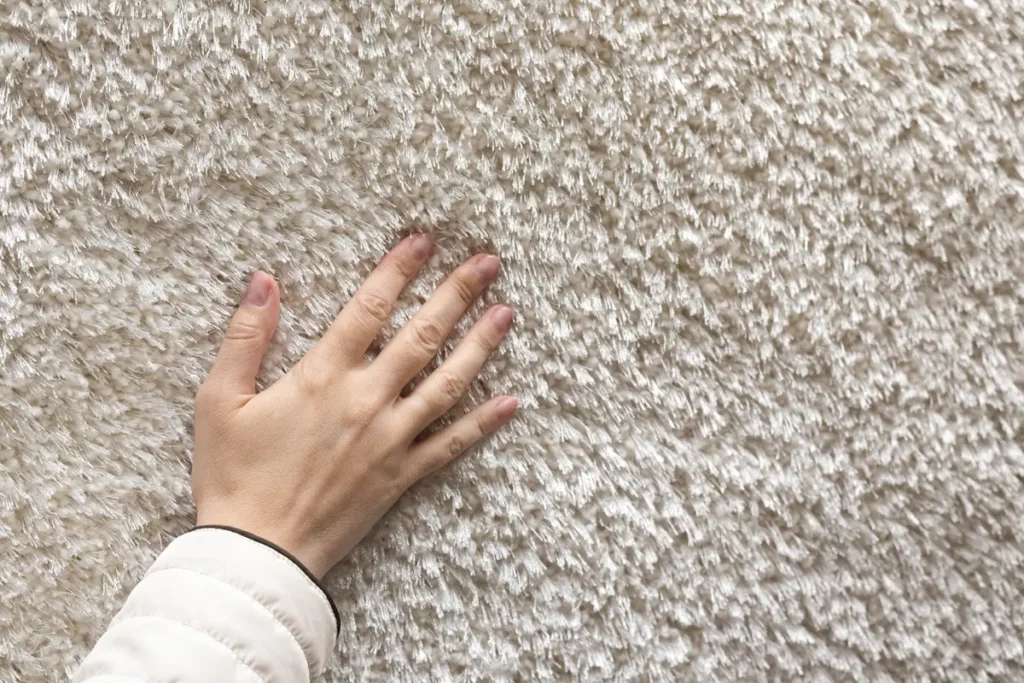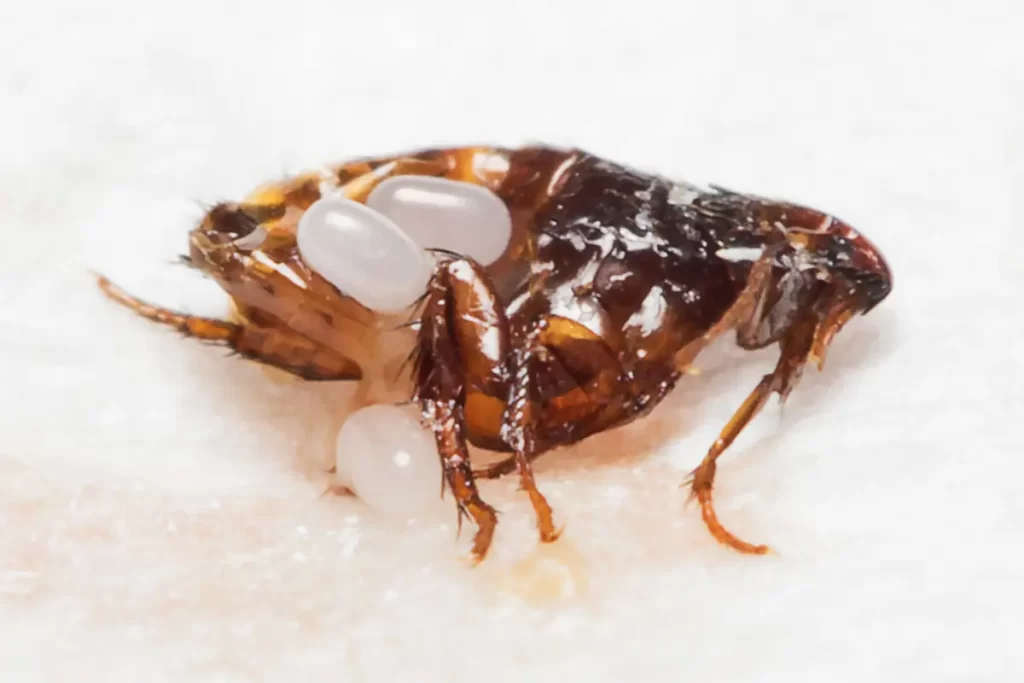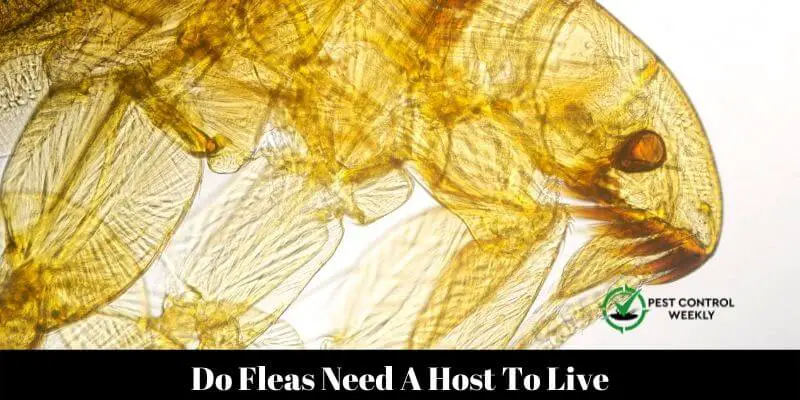A flea will choose a different host, and getting rid of every last flea you can locate can be a significant headache. But, if a flea loses its host, do fleas need a host to live?
Yes, fleas require a host to survive. They will die fast if they are isolated from the host for an extended period of time. Fleas are parasitic. They require a consistent supply of blood to survive. Adult fleas become dependent on their host’s blood.
However, while adult fleas require blood from their hosts, fleas in their early stages do not. To learn more about fleas’ needs on their host, please read the entire article.
Hosts Of Fleas
Cats and dogs are the primary hosts for fleas, however, they can also feed on people and other mammals. Rodents, particularly rats, are another group of fleas’ primary hosts.
Dog / Cat As Host

The flea is a common parasitic insect whose primary hosts are domestic cats and dogs, while many fleas discovered on dogs are also of this species. As holometabolous insects that go through a complete metamorphosis, cat fleas go through all four phases of their life cycle: egg, larva, pupa, and imago.
Before fleas may begin to reproduce as adults, they must consume blood. Unless the host develops a sensitivity to the flea’s saliva, a few fleas rarely cause adult cats any harm. There are fifteen compounds that can cause allergies in flea saliva.
Human As A Host

Fleas do not live on humans. They bite the feet, ankles, and legs by jumping from an affected pet or another animal, but it is most commonly from a contaminated pet bed. Fleas do not live on people because they lack many hairs, as do animals, and reproduction is challenging without the protection of fur or feathers.
For a flea to have a chance to lay viable eggs, the human must be fed on for a continuous period of 12 hours. A flea would be unlikely to be able to feed on a person for that long without being discovered and eliminated.
How Do Fleas Get To Their Host?

Flea eggs can remain latent for amazingly extended periods of time under diverse settings. They wait until they can catch a ride before lying dormant in the yard or on carpet and furniture. To find a host, they leap huge distances and ride on animals and people.
Only 5% of fleas spend their whole lives as adults; the other 95% are either eggs, larvae, or pupae. Adult fleas leap onto your cat or dog, ingest its blood, and then begin laying eggs. A single female can lay up to 50 eggs each day, which she deposits on carpets and beds before they hatch.
The developed eggs, or larvae, release pupae after moving farther away from light, deeper into carpets, and below furniture. The larvae devour organic waste and are capable of eating tapeworm eggs at this stage, making them an intermediate host for the growth of tapeworms.
Can Fleas Survive On Humans Alone?
Fleas do not live on humans because, unlike animals, they lack thick hair and find it difficult to breed without the covering of fur or feathers. According to a laboratory experiment, a flea needs to feed on a person for a continuous period of 12 hours in order to have the possibility to develop healthy eggs.
Humans lack fur and feathers, allowing them to lay eggs and reproduce on a regular cycle. Fleas typically jump from an afflicted pet or another animal to bite down at the human feet, ankles, and legs, but this is most frequently from a contaminated pet bed.
Fleas can live on rodents, animals, and other mammals and birds. Fleas come in 2,500 different varieties worldwide. Some animals’ fur or feathers are what attract fleas to them. They can conceal and eat by burrowing inside their fluffy bodies.
Can Fleas Survive Without A Pet Host?

Adult fleas can survive for up to two weeks without clinging to a host animal. Females have up to two weeks to find a pet host and reproduce, even though they can’t reproduce during that time.
One adult female flea that is pregnant can give birth to a lot of fleas quickly because of how quickly they multiply. This is absolutely not what you want in your house or yard.
Fleas that are adults look for secure hiding spots where they can wait for their victim. bedding, soft furnishings, and carpets and rugs inside the house. Fleas hide in the yard’s grass, bushes, and overgrown vegetation. Additionally, they hide near porches, sheds, decks, and pet homes. Standing water is one environment in which fleas cannot thrive.
Fleas have a natural ability to detect movement, body temperature, and respiration in host species. They’re not only there for the animals, either. When hosts with animals are not available, fleas will bite humans instead.
How Long Can Flea Eggs Live Without A Host?

Female fleas lay eggs while linked to the host, although the eggs survive without a host on nonliving items. These eggs usually fall into the flooring or tiny cracks in the house because they are unattached. Due to their excellent concealment and darkness, this is where flea eggs flourish. Usually, flea eggs hatch in two to twelve days.
When flea eggs hatch, larvae—legless embryos—appear. Being blind, these larvae avoid light sources by hiding. They often emerge from the eggs by digging further into the carpet fibers. They will bury themselves in the ground or plant roots in the wild to avoid the sun, which bothers their underdeveloped vision.
The larvae feed on the mother flea’s pre-digested blood packets as they grow. With no need to attach to a host in order to obtain nutrition, this enables them to flourish during this teenage stage.
How Long Can Flea Larvae Survive Without A Host?
Larvae can survive without a host for up to 4 days. The larvae construct tight webs around themselves as they grow and approach adulthood, encasing themselves inside. They can survive in these encapsulations for a maximum of five months without nutrition or light and are known as cocoons or flea pupae.
When fleas are removed from their host, they starve to death in a matter of days. Young fleas that haven’t eaten can survive for about a week without a blood meal. Pre-emerged adults can go into a latent state if they stay in their cocoons. They are able to go without food for as long as 155 days.
Conclusion
Fleas are parasites. To stay alive, they need a constant flow of blood. Adult fleas can survive for a maximum of two weeks without attaching to a host animal. Yes, adult fleas soon die if they are away from their host for any length of time because they become dependent on the blood of their host. This might just last a couple of days. Because humans don’t have thick hair like animals do and because it’s difficult for fleas to proliferate without the protection of fur or feathers, they cannot dwell on people.
References
Abdullah, S., Helps, C., Tasker, S. et al. Pathogens in fleas collected from cats and dogs: distribution and prevalence in the UK. Parasites Vectors 12, 71 (2019).
Metagenomic analysis of human-biting cat fleas in urban northeastern United States of America reveals an emerging zoonotic pathogen


